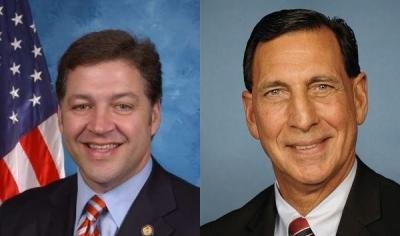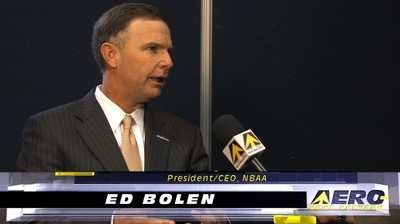Themes Reflect Chairman Shuster's Speech To International Aviation Club
The Aviation subcommittee of the House Transportation Committee held a hearing Thursday on the future of the U.S. aviation industry following a speech Wednesday by full committee chair Bill Shuster (R-PA) at the International Aviation Club.

In his opening statement, Chairman Shuster (pictured, left) said that while, in his view, the U.S. system is the best in the world, "we have an obligation to improve it. The status quo is unacceptable – we need bold, innovative ideas. The only way to improve our system is to listen, and this hearing is the beginning of that process as we work toward the next FAA reauthorization. I want to put all ideas on the table and listen to input from everyone.
"I recognize our system is unique, with more airports and commercial and general aviation activity than elsewhere in the world," Shuster said. "But our ultimate goal should be to compare our system with other global aviation leaders and use what works best to ensure the American aviation industry remains economically viable, globally competitive, and most importantly, safe.
"The next reauthorization bill shouldn’t be my vision, or Congress’ vision. It needs to be a collective vision that benefits everyone."
Subcommittee chair Frank LoBiondo (R-NJ) (pictured, right) said in his opening remarks that ensuring implementation of the FAA Reform Act passed last year remains a top priority of the Subcommittee. "This includes all of the ongoing work at the William J. Hughes Technical Center on important programs such as NextGen, unmanned aircraft systems, and critical FAA safety initiatives," he said, "but along with ensuring implementation of the Reform Act, we must also begin to look ahead to the next one.
"It is an understatement to say that aviation is a key sector of the U.S. economy. Commercial aviation represents five percent of our gross domestic product and roughly ten million American jobs. General aviation (GA) contributes about $150 billion to the economy and supports roughly 1.2 million jobs. Commercial airports support over 10 million jobs and create annual payrolls of $365 billion. Clearly, a healthy and safe aviation industry is good for the economy; it’s good for job creation; it’s good for passengers; and it’s good for all stakeholders.
"The FAA forecasts long term aviation growth, resulting in increased air traffic," LoBiondo said. "These forecasts highlight the need to modernize the air traffic control system, streamline certification and rulemaking processes, and ensure that the FAA is properly organized to oversee the NextGen program.
"Additionally, foreign competition and ongoing funding challenges must also be addressed. We want to create an environment that allows for a healthy aviation industry while making sure that the United States remains the gold standard of aviation innovation and safety."

Among the witnesses was NBAA president and CEO Ed Bolen, who addressed key aspects the organization believes are imperative for the agency to perform its mission effectively, while also reducing costs. These include streamlining the certification process for light aircraft; moving toward further consolidation of agency departments and functions, as outlined in the FAA Modernization and Reform Act of 2012; and prioritizing development of Next-Generation (“NextGen”) air traffic control management technologies.
“As the members of this subcommittee are well aware, the transition to a ‘NextGen’ air-transportation system will advance important national objectives, including further reduction of the industry’s environmental footprint, the reduction of long-term costs at the FAA, enhancements to safety, expansion of system capacity and reductions in delays,” Bolen said. “No other nation’s aviation system comes close to matching our own; at the same time, we recognize that this is not a time for complacency, or for accepting the status quo.”
Bolen also highlighted three of NBAA’s “Guiding Principles” for lawmakers and the FAA to follow in coming policy and legislative discussions affecting the general aviation (GA) community, including business aviation:
- Federal investment in the FAA through a robust general fund contribution to the agency's operating budget;
- Preservation of the general aviation fuel-based revenue system, which provides an efficient, fair funding mechanism from the GA community, while also encouraging investment in newer, cleaner, quieter and more efficient aircraft;
- Continued direct congressional oversight over the FAA funding system, providing a stable and consistent level of funding for the national aviation system.
Bolen concluded his remarks by commending aviation subcommittee members for engaging with industry representatives and other stakeholders in this and future discussions on strengthening the nation's aviation infrastructure.

Also appearing was GAMA president and CEO Pete Bunce (pictured), who said that to ensure the industry continues to grow, the FAA must continue to improve its certification process and leverage its resources more efficiently. “As manufacturers, we need clear and consistent leadership in the international aviation marketplace, which means the FAA must actively defend the robustness and efficiency of its safety certification globally,” Bunce said. He also called on the Subcommittee to give the Department of Transportation “a clearer role in advocating for the aviation community within the government and internationally.”
In his testimony, Bunce outlined several steps he thinks the FAA should take to improve the state of general aviation:
- Partner with industry to create efficiencies and streamline the certification process, which will cut certification costs for the government and industry while increasing safety;
- Pursue collaborative, data-driven efforts, such as the General Aviation Joint Steering Committee, to advance technologies to improve safety;
- Recognize fiscal realities of the federal budget by leveraging public and private expertise to advance aviation safety;
- Deliver the consolidation report that Congress called for in the FAA Modernization and Reform Act of 2012 and begin the process of acting on that plan;
- Prioritize NextGen resources; and
- Ensure that resources the industry pays to the federal government in the form of taxes and fees for FAA operations and investments are protected from future government fiscal disruptions.
“From small towns to large metropolitan areas, aviation plays a crucial role in our transportation system,” Bunce said. “As we go forward, we need to ensure that all segments of the aviation industry have an input into charting the future of U.S. aviation policies and that general aviation is integral to economic success in the U.S. and globally,” Bunce said.
 ANN's Daily Aero-Term (04.25.24): Airport Rotating Beacon
ANN's Daily Aero-Term (04.25.24): Airport Rotating Beacon ANN's Daily Aero-Linx (04.25.24)
ANN's Daily Aero-Linx (04.25.24) Klyde Morris (04.22.24)
Klyde Morris (04.22.24) Airborne 04.24.24: INTEGRAL E, Elixir USA, M700 RVSM
Airborne 04.24.24: INTEGRAL E, Elixir USA, M700 RVSM Airborne 04.22.24: Rotor X Worsens, Airport Fees 4 FNB?, USMC Drone Pilot
Airborne 04.22.24: Rotor X Worsens, Airport Fees 4 FNB?, USMC Drone Pilot





